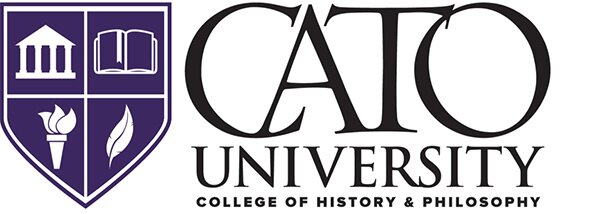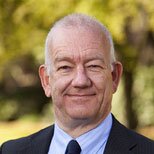October 26-28 • Philadelphia, PA
About Cato University | Schedule | Register | Readings
The American Founders were careful students of history. Thomas Jefferson, in his influential A Summary View of the Rights of British America, prepared in 1774, noted that "history has informed us that bodies of men as well as individuals are susceptible of the spirit of tyranny." Patrick Henry, summed up the importance of history thus: "I have but one lamp by which my feet are guided, and that is the lamp of experience. I know of no way of judging the future but by the past."
Therefore, history is indispensable to understanding and defending liberty under our constitutionally limited, representative government. And at the core of that history is philosophy: the underlying beliefs and values that guided the American Founders in their creating a constitutional order of separated powers, checks and balances, and liberty. Cato University's College of History and Philosophy braids these two powerful subjects together to explore the history of liberty and justice, of wealth and poverty, of individual rights and the rule of law. Come join us to experience history in the exciting and inspiring way the American founders knew it.
Schedule
| Thursday, October 26 | |
| 3:00 – 6:00PM | Registration |
| 6:30 – 7:30PM | Reception |
| 7:30 – 9:30PM | History and the Science of Liberty Dinner Speaker: Tom Palmer, Senior Fellow, Cato Institute; George M. Yeager Chair for Advancing Liberty and Executive Vice President for International Programs, Atlas Network |
| 9:30 – 10:00PM | Bastiat Scholarship Student Meeting |
| 9:30 – 11:00PM | After Dinner Discussion |
|
Friday, October 27 |
|
| 8:00 – 9:00AM | Breakfast |
| 9:00 – 10:15AM | The Experience of Liberty Speaker: Tom Palmer, Senior Fellow, Cato Institute; George M. Yeager Chair for Advancing Liberty and Executive Vice President for International Programs, Atlas Network |
| 10:15 – 10:45AM | Break |
| 10:45 – 12:00PM | The American Enlightenment and Revolution Speaker: Robert McDonald, Professor of History at the United States Military Academy Download a podcast of “The American Enlightenment and Revolution” |
| 12:00 – 1:30PM | Lunch |
| 1:30 – 2:45PM | The Libertarian Synthesis Speaker: Tom Palmer, Senior Fellow, Cato Institute; George M. Yeager Chair for Advancing Liberty and Executive Vice President for International Programs, Atlas Network |
| 2:45 – 3:15PM | Break |
| 3:15 – 4:30PM | The Wealth Explosion Speaker: Steve Davies, Education Director at the Institute of Economic Affairs |
| 4:30PM | Free Time |
| 6:30 – 7:30PM | Reception |
| 7:30 – 9:30PM | War and the Rise of the American State Dinner Speaker: Christopher A. Preble, Vice President for Defense and Foreign Policy Studies, Cato Institute Download a podcast of “War and the Rise of the American State” |
| 9:30 – 10:30PM | Bastiat Scholarship Student Meeting |
| 9:30 – 11:00PM | After Dinner Discussion |
|
Saturday, October 28 |
|
| 8:00 – 9:00AM | Breakfast |
| 9:00 – 10:15AM | The Spread of Libertarian Thought from the Enlightenment Onwards Speaker: Steve Davies, Education Director at the Institute of Economic Affairs Download a podcast of “The Spread of Libertarian Thought from the Enlightenment Onwards” |
| 10:15 – 10:45AM | Break |
| 10:45 – 12:00PM | America to the Civil War and Beyond Speaker: Robert McDonald, Professor of History at the United States Military Academy |
| 12:00 – 1:30PM | Lunch |
| 1:30 – 2:45PM | The Ideological Challengers to Liberty Speaker: Steve Davies, Education Director at the Institute of Economic Affairs Download a podcast of “The Ideological Challengers to Liberty” |
| 2:45 – 3:15PM | Break |
| 3:15 – 4:30PM | Transformations of American Government from WWI to Today Speaker: Robert McDonald, Professor of History at the United States Military Academy Download a podcast of “Transformations of American Government from WWI to Today” |
| 4:30PM | Free Time |
| 6:30 – 7:30PM | Reception |
| 7:30 – 9:30PM | The Founders' Legacy Dinner Speaker: David Boaz, Executive Vice President, Cato Institute |
| 9:30 – 10:00PM | Bastiat Scholarship Student Meeting |
| 9:30 – 11:00PM | After Dinner Discussion |
About Cato University | Schedule | Register | Readings
In addition to his work at Cato, Preble teaches the U.S. Foreign Policy elective at the University of California, Washington Center (UCDC). Before joining Cato in February 2003, he taught history at St. Cloud State University and Temple University. Preble was a commissioned officer in the U.S. Navy, and served onboard USS Ticonderoga (CG-47) from 1990 to 1993. Preble holds a Ph.D. in history from Temple University.





